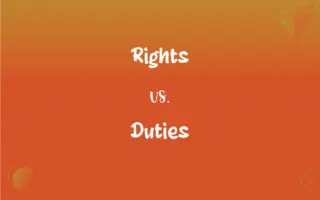Horrible vs. Terrible: What's the Difference?
Edited by Aimie Carlson || By Janet White || Published on December 4, 2023
Horrible describes something causing horror or disgust, while terrible indicates something extremely severe or serious in nature, often evoking fear or dread.

Key Differences
Horrible often conveys a sense of disgust or repulsion. Terrible, on the other hand, implies a sense of fear or overwhelming severity.
In usage, horrible can describe experiences, objects, or situations that are highly unpleasant or offensive. While, terrible is frequently used to describe events or situations with grave consequences or extreme intensity.
Horrible is associated with eliciting horror or revulsion, often relating to the senses. However, terrible might evoke a deeper, more intense emotional reaction like fear or alarm.
The term horrible is often used in everyday language to describe something that is very unpleasant. Whereas, terrible can denote something that is exceptionally bad or serious, often beyond mere unpleasantness.
Horrible might be used to describe something ghastly or gruesome in nature. In contrast, terrible often describes something formidable, causing great fear or apprehension.
ADVERTISEMENT
Comparison Chart
Primary Connotation
Disgust and horror
Fear and severity
Usage in Language
Describing unpleasant or offensive scenarios
Indicating extreme intensity or seriousness
Emotional Reaction
Elicits revulsion or horror
Evokes fear or alarm
Context of Use
Often in everyday unpleasant situations
Used for situations with grave consequences
Severity of Implication
Generally less severe, more about disgust
More about severity and extreme seriousness
ADVERTISEMENT
Horrible and Terrible Definitions
Horrible
Horrible is something extremely unpleasant or deplorable.
The living conditions in the camp were horrible.
Terrible
Terrible implies a high degree of intensity or severity.
He was in terrible pain after the accident.
Horrible
Horrible can describe a very bad or poor quality.
The play received horrible reviews.
Terrible
Terrible is used for emphasizing the extent of something bad.
She had a terrible time trying to find a job.
Horrible
Horrible means causing or likely to cause horror.
The movie was so horrible that I couldn't watch it.
Terrible
Terrible means extremely bad or serious.
The earthquake caused terrible destruction.
Horrible
Horrible is used to express dismay or displeasure.
The weather today is absolutely horrible.
Terrible
Terrible can describe something causing fear or dread.
There was a terrible storm last night.
Horrible
Horrible implies a sense of shock or disgust.
They found a horrible mess in the abandoned house.
Terrible
Terrible can mean formidable in degree or extent.
He has a terrible temper when he's angry.
Horrible
Arousing or tending to arouse horror; dreadful
"War is beyond all words horrible" (Winston S. Churchill).
Terrible
Causing great fear or alarm; dreadful
A terrible bolt of lightning.
A terrible curse.
Horrible
Very unpleasant; disagreeable.
Terrible
Extremely formidable
Terrible responsibilities.
Horrible
A thing that causes horror; a terrifying thing, particularly a prospective bad consequence asserted as likely to result from an act.
Terrible
Extreme in extent or degree; intense
"the life for which he had paid so terrible a price" (Leslie Fiedler).
Horrible
A person wearing a comic or grotesque costume in a parade of horribles.
Horrible
Causing horror; terrible; shocking.
Horrible
Tremendously bad.
Horrible
Exciting, or tending to excite, horror or fear; dreadful; terrible; shocking; hideous; as, a horrible sight; a horrible story; a horrible murder.
A dungeon horrible on all sides round.
Horrible
Provoking horror;
An atrocious automobile accident
A frightful crime of decapitation
An alarming, even horrifying, picture
War is beyond all words horrible
An ugly wound
FAQs
What does terrible mean?
Extremely severe, serious, or causing fear.
Is horrible always negative?
Yes, it describes negative and unpleasant situations.
Can terrible have a positive connotation?
Rarely, in some contexts, it might be used hyperbolically to mean formidable.
What does horrible mean?
Causing horror, very unpleasant or offensive.
How do emotions differ in horrible vs terrible?
Horrible evokes disgust or horror, terrible evokes fear or alarm.
Can something be horrible but not terrible?
Yes, if it’s very unpleasant but not particularly serious or fearful.
What is an example of a terrible situation?
Experiencing a terrible natural disaster.
Can something be terrible but not horrible?
Yes, if it's severe or serious but not necessarily disgusting or horrifying.
Do horrible and terrible have the same intensity?
Not always; terrible often implies a higher degree of severity.
Can foods be described as horrible?
Yes, especially if they taste very bad or are spoiled.
Can horrible and terrible be used interchangeably?
While similar, they have different connotations; horrible is more about disgust, terrible about severity.
Is terrible used for emotional states?
Often, particularly when describing intense or severe emotions.
Can terrible be used to describe a difficult task?
Yes, especially if the task is particularly daunting or hard.
Do horrible and terrible have different origins?
Yes, horrible comes from Latin 'horrere', while terrible from Latin 'terrere', meaning to
What is an example of a horrible situation?
Discovering a horrible smell in the kitchen.
What synonyms can be used for terrible?
Frightful, awful, dire.
Can horrible be used in a casual context?
Yes, it's often used informally to describe less severe situations.
What synonyms can be used for horrible?
Disgusting, dreadful, appalling.
Is horrible used for physical sensations?
It can be, especially if they cause discomfort or revulsion.
Is it appropriate to describe an accident as terrible?
Yes, particularly if it's serious or has severe consequences.
About Author
Written by
Janet WhiteJanet White has been an esteemed writer and blogger for Difference Wiki. Holding a Master's degree in Science and Medical Journalism from the prestigious Boston University, she has consistently demonstrated her expertise and passion for her field. When she's not immersed in her work, Janet relishes her time exercising, delving into a good book, and cherishing moments with friends and family.
Edited by
Aimie CarlsonAimie Carlson, holding a master's degree in English literature, is a fervent English language enthusiast. She lends her writing talents to Difference Wiki, a prominent website that specializes in comparisons, offering readers insightful analyses that both captivate and inform.








































































